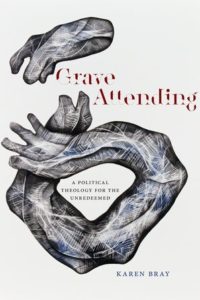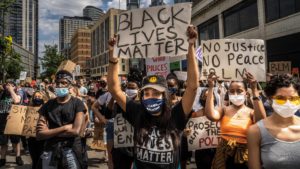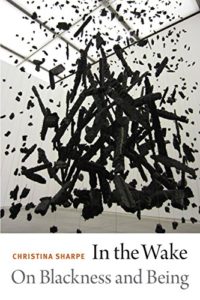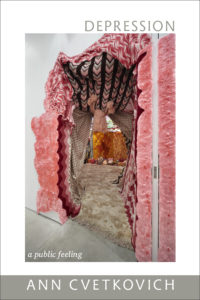On Moodiness and Righteous Rage
Kali Handelman interviews Karen Bray about her book Grave Attending and what it can teach us about today's protests for racial justice
It’s possible I shouldn’t admit this, but I first learned about Karen Bray’s new book, Grave Attending: A Political Theology of the Unredeemed, from an alumni update in a newsletter from Eugene Lang College (the undergraduate liberal arts program at The New School) where she and I both graduated and returned to teach. Bray and I have moved through and overlapped in the same spaces for many years, yet we’ve never met in person. So perhaps it wasn’t that strange that I should finally get the opportunity to think with her by way of her intimate and expansive scholarship in this moment, as the coronavirus lockdown stretches through its fourth month and the Movement for Black Lives continues to pulse through our streets.
Grave Attending is about moods, individual and public, emotional and political, embodied and spiritual; it is about why we feel the way we do and how we can imagine and build new futures in and with these feelings. She combines critical theories of gender, race, affect, and theology with storytelling, personal reflection, and pop culture to weave a unique and effective method. Reading Bray’s book gave me a sense of being both grounded and restless — feelings that, themselves, I realized were deeply productive ways of working through her ideas and into our conversation. I’m grateful to her for engaging with me and with these questions and hope that we will, one day, get to continue this exchange in person.
Kali Handelman: Over the course of the last month, as our collective attention expanded from the experience of lockdown to the worldwide Black Lives Matter uprising, I found myself grateful for the concepts and language you offer in your book. It seems uncannily well-timed, though maybe that’s because we’ve actually been in this mood for a while? I wanted to start by asking you to tell us what led you to the book? What got you into moodiness as a topic of study?
 Karen Bray: Yes, it’s been both heartening and disheartening to hear from many people that the book is resonating with them in this particular moment. Heartening because maybe there are some concepts in the book, some ways of being in the world, that might be of use right now, or at the very least which could help readers feel a little less lonely, isolated, or ashamed of their depression, rage, and anxiety. I think we have been in an unsustainable mood of global anxiety and of both righteous and toxic rage and depression because of the unpaid debts and under-acknowledged material (emotional, spiritual, physical, and financial) legacies of neoliberal capitalism, colonialism, white supremacy, and heteropatriarchy (all of which fortify one another). The world sort of has a choice whether to use such a mood to double down on attachments to old/current forms of power (i.e. the white rage behind “Make America Great Again”) or to cultivate such moods towards liberation and transformation (i.e. “Black Lives Matter”). Both “Make America Great Again” and “Black Lives Matter” are lamentant moods, so it is not that moodiness itself will save us. Rather, what I hope the book points to is how important mood is as an expression, tool, and mode of power, and to whose mood we count as redeemable and whom we leave unredeemed in order to make some moods respectable and others depraved, criminal, out-of-joint, etc.
Karen Bray: Yes, it’s been both heartening and disheartening to hear from many people that the book is resonating with them in this particular moment. Heartening because maybe there are some concepts in the book, some ways of being in the world, that might be of use right now, or at the very least which could help readers feel a little less lonely, isolated, or ashamed of their depression, rage, and anxiety. I think we have been in an unsustainable mood of global anxiety and of both righteous and toxic rage and depression because of the unpaid debts and under-acknowledged material (emotional, spiritual, physical, and financial) legacies of neoliberal capitalism, colonialism, white supremacy, and heteropatriarchy (all of which fortify one another). The world sort of has a choice whether to use such a mood to double down on attachments to old/current forms of power (i.e. the white rage behind “Make America Great Again”) or to cultivate such moods towards liberation and transformation (i.e. “Black Lives Matter”). Both “Make America Great Again” and “Black Lives Matter” are lamentant moods, so it is not that moodiness itself will save us. Rather, what I hope the book points to is how important mood is as an expression, tool, and mode of power, and to whose mood we count as redeemable and whom we leave unredeemed in order to make some moods respectable and others depraved, criminal, out-of-joint, etc.
To turn to your first question, I got into the book at its most basic level because of being moody. I have bipolar 2 disorder and PTSD and my emotional range has always been a bit larger than what seems to count as “normal.” I vibrate with emotion—excessive joy in the joyous moments, oversensitivity to the tragic moments. And as a result I have always felt a little out of joint with the world. A little too emotional, a little too loud, a little too sensitive, a little too combative, a little too fast thinking, a little too talkative, a little too much. I was too much and not enough all at once and all the time. I knew somewhere in my soul that the overflow of emotion also meant good things like being unafraid of others’ traumas, connecting with people quickly, building community, reading a room, being smart about people and ideas, but it also felt like a great burden, like I would never succeed in the right way at the right time at anything. While I was feeling all of that moodiness within, I was being inspired by activists living moods out loud. From 2005 to 2007 I worked for the hotel worker’s union in NYC. There, worker’s rage over working conditions was funneled into strategic movement building. In 2007-2009 I did witness bearing work in Honduras with women who were lamenting feminicide (the state sanctioned killing of women). These women poured their grief into the public square, discomforting passersby, and building solidarity that set the groundwork for a women-led movement against a right wing coup. Lament in the public square was transformative. Moodiness, took on a different meaning for me working with these women. As early as my Master’s thesis I was writing a theology of lament in the face of trauma. That theology morphed for me as my doctoral work progressed and I was introduced to affect and disability theory and then Black studies, which helped me to find language for the need to reframe “negative” emotion and moodiness and see the resistant potential in being out-of-joint. My bipolar moods meant I couldn’t work on capitalist time, which meant I could see and feel a temporality beyond capitalism. But why mood? Because I’m a moody dame, and you write what you need.
KH: And can you tell us what “grave attending” and “grave attention” mean — in the work of the book and to you in the present moment?
KB: Grave attending is the practice of being brought down by the gravity of what is. Grave attending is about paying attention and being accountable to whose identities, what social systems, and which moods had to be denied, belittled, criminalized, pathologized, or defamed to construct white, propertied, male, straight, and able-bodied as the norm and capitalism, productivism, politeness, and docility as social goods. It is about me attending both to what kind of flourishing I might have had if I had not been told my moods were disordered and worthy of shame, and it is about me attending to the ransom of Black life made so that my model white womanhood could count as good. Importantly, it is a practice. It is something we have to keep working at. I do not believe that some brand new thing is coming to save us out of the blue, or that some God will burst in and lift us all up. If we are to salvage this world it will be from possibilities that hegemonic powers wanted to kill off and keep buried, so grave attending is being open to the resurgence of those possibilities.
 Right now I think the pandemic and the racial revolution being led by Black Lives Matter and BIPOC youth have demanded we pay grave attention. The pandemic slowed life down for many and sped it up for others. It created bipolar time for us all. Days of total grief and paralyzing fear, other days of hyper anxiety or juggling childcare and work, or for essential workers, non-stop maddening work. Time being out of joint for everyone forced a kind of attention-paying that woke many up to how broken our system is. I don’t think we can separate this moment of awakening to shared vulnerability brought by the pandemic to the (finally some) grave attention more white people are paying to Black death in the wake of the murders of George Floyd, Breonna Taylor, Amaud Arbery, Tony McDade, Elijah Mcclain, and so many others. The shift in more people filling the streets in protest of these murders, and the growing popularity of defunding the police and of Black Lives Matter, is of course due to massive organizing efforts (primarily by BIPOC) over the last decade, but it is also about a shift in mood, one that took more people, particularly more white people, finally paying greater and graver attention. More people in the last four months have been brought down by the gravity of what actually is–that we do not have functioning healthcare or a functioning government, and that we do live in a white supremacist police state. The question remains for me how we keep such grave attention up and how we best materially support the possibilities being resurfaced, like police abolition. One way my book, along with many others, offers is to not police and professionalize the mood of the protests. This moment could not be a greater example of how supposed “disorder” is necessary for transformation.
Right now I think the pandemic and the racial revolution being led by Black Lives Matter and BIPOC youth have demanded we pay grave attention. The pandemic slowed life down for many and sped it up for others. It created bipolar time for us all. Days of total grief and paralyzing fear, other days of hyper anxiety or juggling childcare and work, or for essential workers, non-stop maddening work. Time being out of joint for everyone forced a kind of attention-paying that woke many up to how broken our system is. I don’t think we can separate this moment of awakening to shared vulnerability brought by the pandemic to the (finally some) grave attention more white people are paying to Black death in the wake of the murders of George Floyd, Breonna Taylor, Amaud Arbery, Tony McDade, Elijah Mcclain, and so many others. The shift in more people filling the streets in protest of these murders, and the growing popularity of defunding the police and of Black Lives Matter, is of course due to massive organizing efforts (primarily by BIPOC) over the last decade, but it is also about a shift in mood, one that took more people, particularly more white people, finally paying greater and graver attention. More people in the last four months have been brought down by the gravity of what actually is–that we do not have functioning healthcare or a functioning government, and that we do live in a white supremacist police state. The question remains for me how we keep such grave attention up and how we best materially support the possibilities being resurfaced, like police abolition. One way my book, along with many others, offers is to not police and professionalize the mood of the protests. This moment could not be a greater example of how supposed “disorder” is necessary for transformation.
KH: Your book is profoundly interdisciplinary and intertextual — combining religious studies, theology, affect theory, queer theory, disability studies/ crip theory,[1] media studies, and more. I’m particularly interested in the fact that you situate the project as a work of political theology. You write, “At its core, this book attempts to construct a political theology attendant to moody and material life.” I’d love to think with you about what we gain from thinking about these questions — of productivity, of bodies, of race and gender and feeling — within the practices and concepts of political theology, for instance, salvation and redemption?
KB: I am a theologian who does not hold the Christian God, or a transcendent God as primary. Political theology (as a theological discipline that does not need to center a God figure) was central to this project because it insists that theological thinking is happening in the secular sphere and happening in ways that we must grapple with if we are to deal with power, both toxic and liberatory. My frustration with political theology has been that certain Western strains seem to talk a lot about salvation, power, redemption, and economy without dealing with material histories, bodies, and moods. It felt very disembodied and sanitized, even in the leftist versions that should be attendant to the marginalized and processes of marginalization. Theological concepts of redemption and salvation were of particular importance to me, because part of my theological diagnosis of the problems with neoliberalism are the systems of redemption it offers. One must be a profitable investment to be saved under neoliberal capitalism. Such an economy of salvation, it seems to me, leaves far too many of us damned and, perhaps worse, bargaining for our redemption by ransoming others. This is in part why I am so drawn to the concept of Holy Saturday. Both neoliberalism and too often Christian theologies rely on a Friday/Sunday salvation economy, in which once damaged, we need to resurrect quickly to be of worth again. So under neoliberalism we work ourselves to sickness, and then invest in an economy of resilience to be back to work as fast as possible, only to repeat such a damage resurrection cycle and infuse more money back into the system over and over again. Or in another register, if impoverished white people have been crucified for the economy instead of taking the time to feel such a trauma and correctly diagnose for whom they were strung up on the cross, there is a push to sacrifice impoverished Black people and immigrants to resurrect quickly back into worth. Holy Saturday does not rush to Sunday, but rather invites us to sit with the pain of crucifixion and to refuse Sundays built on the ransom of others for our redemption. Such political theological concerns are central to my book.
KH: There is also a theme of haunting that, well, haunts the book. Without being too cute about it, it really does sort of spectrally hover. I wonder if you can say more about how you think about haunting? What does it mean to be haunted? Is being haunted a mood we should be thinking more about? How do haunting and mourning come together — or not?
 KB: Haunting returns us to the graves. Again, I do not think we will be saved or really freed from the in-breaking of the new, but rather if there is any chance for liberation and transformation it is from being haunted by the deaths that demand our attention, in particular for me by Black death, and therefore also by what Black life has meant. I want to be haunted by what might have been, a kind of Afrofuturist vision perhaps, if we had not colonized and enslaved. I do not want this out of sympathy, but because my liberation from white supremacy demands it. Our lives are already haunted by such death, and by visions of another way that have been manipulated and commodified and used for ill. Indeed, we are all haunted by such death whether we want it or not. Our country was and continues to be built on violent death. So the question is whether we will let the ghosts in so we can learn from them, or whether we will pretend they are not there. Mourning is a part of being haunted, in that we both have to mourn the dead that we have avoided for so long, but perhaps more importantly in being haunted by the death we have to mourn the innocence we thought our lives contained. We — here being white people — have to get over our need for innocence so that we can do the hard work of liberation from the systems that murder and try to keep the ghosts buried. This is why work like Christina Sharpe’s on Black life lived in the wake of state sanctioned death in In the Wake: On Blackness and Being is so crucial. The haunting is unavoidable if you are forced to live in the wake. It’s up to those of us who have avoided such attendance to show up for the wake-work.
KB: Haunting returns us to the graves. Again, I do not think we will be saved or really freed from the in-breaking of the new, but rather if there is any chance for liberation and transformation it is from being haunted by the deaths that demand our attention, in particular for me by Black death, and therefore also by what Black life has meant. I want to be haunted by what might have been, a kind of Afrofuturist vision perhaps, if we had not colonized and enslaved. I do not want this out of sympathy, but because my liberation from white supremacy demands it. Our lives are already haunted by such death, and by visions of another way that have been manipulated and commodified and used for ill. Indeed, we are all haunted by such death whether we want it or not. Our country was and continues to be built on violent death. So the question is whether we will let the ghosts in so we can learn from them, or whether we will pretend they are not there. Mourning is a part of being haunted, in that we both have to mourn the dead that we have avoided for so long, but perhaps more importantly in being haunted by the death we have to mourn the innocence we thought our lives contained. We — here being white people — have to get over our need for innocence so that we can do the hard work of liberation from the systems that murder and try to keep the ghosts buried. This is why work like Christina Sharpe’s on Black life lived in the wake of state sanctioned death in In the Wake: On Blackness and Being is so crucial. The haunting is unavoidable if you are forced to live in the wake. It’s up to those of us who have avoided such attendance to show up for the wake-work.
KH: Can we talk a bit more about Neoliberalism? First, how do you define it? Second, can you walk us through how thinking about moods like exhaustion are necessary for critiquing neoliberalism?
KB: I guess I would define neoliberalism as an economic and sociopolitical system that defines all worth by market value or profitability. So it is an extreme form of capitalism, one which spreads its accounting of worth into every realm of life. Under neoliberalism there is no private and public sphere, no work time and off time, because all time is under the framework of its profitability. For one of the best conversations/introductions to neoliberalism I would suggest Wendy Brown’s Undoing the Demos.
Exhaustion as a mood has little worth in neoliberalism, unless one is desperate to solve exhaustion quickly. By this I mean, if one is exhausted they are not being productive nor profitable for the system, unless they are buying drugs or self-help books or wellness regimes that funnel money back into the system. Neoliberalism does not mind exhaustion in this way because it can exhaust material, in this case human material, which then buys its way out of exhaustion so that it can be exhausted by the work of neoliberalism again. If we embrace exhaustion, and actually let ourselves ask the question “why am I so exhausted?” And “what would real rest mean”? We monkey with the machine that needs us to be desperately trying to get back to our productive and profitable capacities. This is why I am drawn to the work of Robin James on resilience and melancholy. She uses pop music to talk about the impulse to overcome our damage. For instance, she compares Lady Gaga’s music where her “little monsters” grow up to be good citizens overcoming the damage of being outsiders, to Rihanna, whom for James rejects overcoming both in terms of the dynamics of her music and the images in her music video. James is particularly interested in Rihanna’s video for the song “Diamonds” in which the video ends not with an upbeat pop star, but with Rihanna floating in water. Rihanna here is not letting the water drown her, nor is she pretending to not be exhausted by it. She is floating with it, and so attending to it.
 KH: In the book you write, “one can speak ethically without speaking morally.” This really jumped out at me and I’d love it if you could expand on the difference, and the necessity of speaking ethically rather than morally in this moment.
KH: In the book you write, “one can speak ethically without speaking morally.” This really jumped out at me and I’d love it if you could expand on the difference, and the necessity of speaking ethically rather than morally in this moment.
KB: I am sure there are philosophers more attuned to strict definitions who will disagree with the following, but in this case I am thinking of morality as a tool of biopower, a set of coded moral principles whose rigidity is used by those in control to mete out punishment and reward. It is another tool of some ransoming others for their redemption. Ethics, on the other hand, at least as I am using it, is a practice, a doing that takes contextual sensitivity. To speak ethically would be to speak with claims to righteousness that are open to challenge, but also which demand action to test out, and not just boundary drawing. For example, the term “family values” and its homophobic and anti-reproductive justice implications uses morality in a biopolitical way to police women and queer bodies. Conversely, people who work in reproductive justice ask questions about the sociopolitical contexts in which individual and collective reproductive choices are made and therefore must be agile in drawing ethical conclusions about right and wrong in various situations.
KH: I really appreciate how you brought your own academic life — graduate school, precarious labor, your teaching and your students — into the book. That’s both generous and brave and I think it was a way of modeling the work you are asking of the reader. I’m interested in why you felt it was important to integrate yourself and your work into the book in this way?
 KB: In many ways the style of including personal narrative in the book is a mimicry (I hope in a good, not derogatory way) of the sources I’m most drawn to, in particular Ann Cvetkovich’s Depression: Public Feeling, the work on critical disability by Robert McRuer, and the work on queer temporality found in José Muñoz and Jack Halberstams oevres,[2] all of which were my early entrée into thinking about mood. These writers use personal experience as part of the tapestry of their scholarly offerings. I also felt that to call for the depathologization of “negative” emotions and for the accounting of the debt to those ransomed for my becoming, I had to share my moods and work through my own shame as part of the sharing. If I want political theology to have more moody and material weight, I need to put my mood and matter into my theology.
KB: In many ways the style of including personal narrative in the book is a mimicry (I hope in a good, not derogatory way) of the sources I’m most drawn to, in particular Ann Cvetkovich’s Depression: Public Feeling, the work on critical disability by Robert McRuer, and the work on queer temporality found in José Muñoz and Jack Halberstams oevres,[2] all of which were my early entrée into thinking about mood. These writers use personal experience as part of the tapestry of their scholarly offerings. I also felt that to call for the depathologization of “negative” emotions and for the accounting of the debt to those ransomed for my becoming, I had to share my moods and work through my own shame as part of the sharing. If I want political theology to have more moody and material weight, I need to put my mood and matter into my theology.
KH: You end the book with a chapter that engages with the subjects of white feminism and fragility and Black rage and breath and aspiration. The book ends with this paragraph:
“If the mode of witness offered by political theology of and for the unredeemed does not seek to save white people—whiteness must take its poison pill. Nor does it request that we be frozen in shame. Knowing white people cannot be innocent, should not lead to more impotence. Nor does such witness portend to see no difference between forms of political and post-secular theology that wish to counter white supremacy and those whose purpose is to fortify it. It asks us to sit with pain, to be humiliated, to be undone by the horror of what white people, my people, have built. Instead of individual or denominational or disciplinary pardon, let us be ungrounded, let us be responsible for the active dismantling of the holds that have sheltered some while violating others for far too long.”
How are you thinking about that chapter’s topics today? What would you like to see more — or less — of in public discourse?
KB: If I were writing the book now, I would never have written the other chapters without having dealt with the issues raised in the last chapter first. This is an excellent thing. By which I mean Blackness, Black death and Black life, and whiteness, can no longer be one part of a larger project, and the last part, the part that came after. It never should have been able to be that way, but of course it has been that way and continues to be that way for far too many of us. The demand of this moment, the demand of living in the wake of colonialism, and enslavement, and white supremacy, and anti-Blackness, and the genocide of indigenous peoples, and neoliberalism means no white academic should be able to write anything without confronting our whiteness and the whiteness of our disciplines. This is good, this is necessary, this will make our work better. And it means indeed that we must be ungrounded and we must actively dismantle. I think this chapter is relevant right now if mainly in its push to read the works of Black thinkers like Christina Sharpe, Fred Moten, Kelly Brown Douglas, and Ashon Crawley. I hope it is relevant in that fellow white people can embrace my call for us to do the work of dismantling, to embrace the vulnerability it takes to admit we have held onto false innocence for too long, and that we need to let what feels unholdable take hold. I hope this chapter is the most relevant and the most critiqued of the book, so that I can keep being ungrounded from my attachments to my own redemption.
***
[1] I really appreciated this definition of Crip Theory from your book: “Crip theory is a version of disability theory that rejects assimilationist politics and apologetics.”
[2] José Esteban Muñoz, Disidentifications: Queers of Color and the Performance of Politics and Cruising Utopia: The Then and There of Queer Futurity ; J. Jack Halberstam, In a Queer Time and Place: Transgender Bodies, Subcultural Lives.
***
Kali Handelman is a Contributing Editor for the Revealer. She is also a freelance academic editor and manager of program development and London regional director for the Brooklyn Institute for Social Research.
Karen Bray is an Assistant Professor of Religion, Philosophy, and Social Change, the Director of Interdisciplinary Programs, and the Director of the Honors Program at Wesleyan College in Macon, GA. In addition to authoring Grave Attending: a Political Theology for the Unredeemed, she is the co-editor of Religion, Emotion, Sensation: Affect Theories and Theologies also from Fordham University Press.